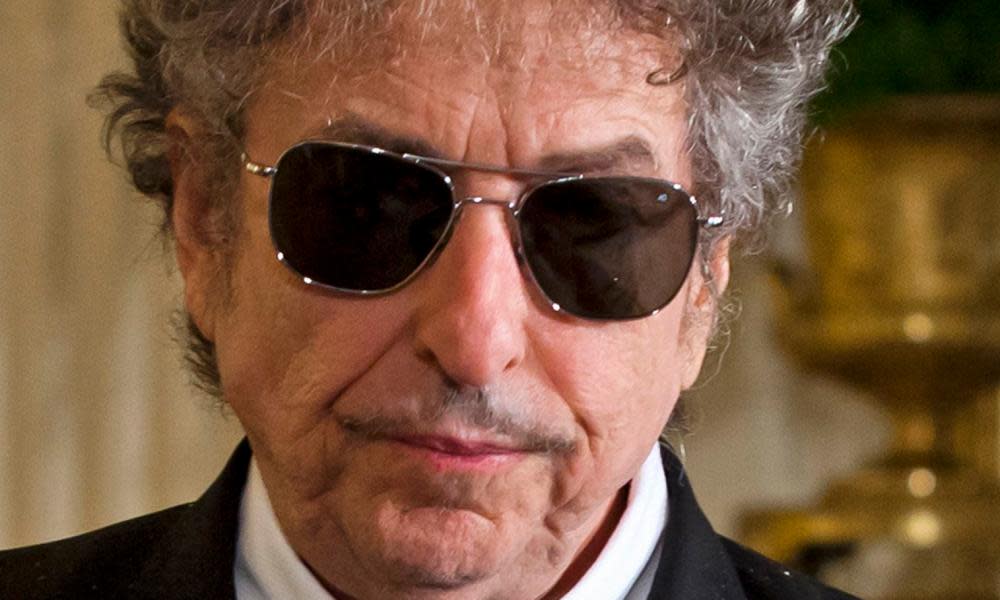Bob Dylan: Murder Most Foul review – a dark, dense ballad for the end times

As with pretty much anything Bob Dylan does these days, you can only speculate at his reasons for unexpectedly releasing a 17-minute song, ostensibly about the assassination of John F Kennedy, that gradually turns into a litany of cultural references taking in everything from Shakespeare to Stevie Nicks to silent-movie comedians, from the Moonlight Sonata to Jelly Roll Morton to A Nightmare on Elm Street.
And – as with pretty much anything Bob Dylan has ever done – speculate people have. They’ve suggested it’s a harbinger of his first album of original material since 2012. That it’s an outtake from his last album of original songs, Tempest, that’s noticeably better than anything on Tempest, and Dylan has form in leaving the best song off an album: this is, after all, the man who came to the conclusion that Shot of Love was better without Caribbean Wind on it, and Infidels somehow improved by removing Blind Willie McTell.
People have mooted that it’s a standalone release, appearing now because Dylan understandably thinks it’s timely, March 2020 being a pretty apropos moment to release an epic song filled with death and horror and apocalyptic dread (“The age of the antichrist has just begun … it’s 36 hours past judgment day”), or perhaps to give his diehard fans further incentive to stay indoors. You rather get the feeling some of them will still be self-isolating months after the coronavirus all-clear has sounded, delicately unpicking its manifold knotty allusions – the line about playing it for Carl Wilson down Gower Avenue requires the listener to know that the late Beach Boy sang backing vocals on Desperados Under the Eaves, the concluding track from Warren Zevon’s eponymous 1976 album, which ended with the line “look away down Gower Avenue” – and arguing on message boards as to whether the Susie mentioned midway through is just a reference to the Everly Brothers, or to Suze Rotolo, the girlfriend with whom Dylan watched the aftermath of Kennedy assassination unfolding, holed up in their New York apartment.
For a song that lasts 17 minutes, there isn’t a great deal to Murder Most Foul musically. The arrangement hovers atmospherically in the distance, a haze of tumbling piano, lightly struck drums and violin, its softness at odds with the tone of the lyrics. One comparison currently being bandied about is to Don McLean’s American Pie, itself a kind of bubblegum populist take on Dylan’s oblique referential songs of the 60s, but American Pie had a catchy tune and a singalong chorus. Here, there’s nothing that even vaguely resembles a standard structure and Dylan swiftly abandons any pretence of there being a vocal melody: it’s essentially a recitation set to music.
Related: Bob Dylan releases first original song in eight years, 17-minute track about JFK
The point is clearly the lyrics, which are dense and intriguing enough to hold your interest, and give the listener plenty to digest. Quite aside from all the cultural references, there’s a narrator that keeps switching from Kennedy himself to Dylan, who in turn seems to keep switching from firebrand mode to the grimly resigned old grouch of Things Have Changed and It’s All Good (“I hate to tell you Mister but only dead men are free”) and a plethora of details about the assassination itself: “Don’t say Dallas don’t love you, Mr President” is a mangling of the last words spoken to Kennedy by Nellie Connally, the first lady of Texas.
The JFK assassination looms large in Dylan’s history, despite his assurance that “I didn’t feel it more than anybody else … the whole thing about my reaction to the assassination is overplayed”. Certainly, it bothered him enough to give a rambling speech at an awards ceremony shortly afterwards saying he “saw something of himself” in Lee Harvey Oswald. (He was roundly booed.) He also subsequently visited the assassination site and indeed wrote about it, albeit in a sheaf of unpublished typescripts that were auctioned in the 90s. And it’s clearly been bothering him more recently: a 2012 exhibition of his paintings featured one of Oswald and one of Oswald’s killer, Jack Ruby.
Is the litany of music, film and literature that consumes the song’s second half intended to suggest its author thinks art is a meaningless distraction at moments of tragedy, or vitally important? The condescending tone of “Hush little children, you’ll understand / the Beatles are coming, they want to hold your hand” implies the former, although the very timing of Murder Most Foul’s release suggests it’s the latter. It also suggests an artist nearing 80, but continually moving forward – musically, it’s unlike anything Dylan has done before – and as wilfully contrary as ever.
“If I was more sensitive about it than anyone else, I would have written a song about it, wouldn’t I?” he protested in 1971 when asked about the Kennedy assassination. Now he has.

 Yahoo News
Yahoo News 
